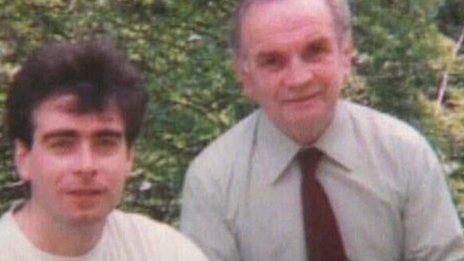Paul Bodin on when Wales were a spot-kick away from the World Cup
- Published

There are many "what ifs" when it comes to Wales and the World Cup but, exactly 20 years on from their most recent qualifying near-miss, the pain remains.
If you can bear it, cast your mind back to 17 November 1993. In the final game of their campaign, Wales needed to beat Romania in Cardiff to make it to USA 94.
With half an hour to go and the score 1-1, the Welsh were awarded a penalty. Controversial spot-kicks against them had cost them a place at the 1978 and 1986 World Cups., external Here, then, was the perfect way to ensure Wales would not miss the party this time.
By now, even the English were watching: with Wales the only home nation with a chance of progressing, the BBC abandoned coverage of their game in San Marino to show events in Cardiff live as Swindon defender Paul Bodin took the ball and placed it on the spot.
Viewing figures increased from 2.2 million to 12.9 million after the switch, although 34,000 people phoned the BBC in the space of five minutes to complain. If they kept watching, though, they witnessed a moment that remains engrained in the Welsh national psyche.
Instead of putting Wales a giant step nearer to the United States, Bodin smashed his spot-kick against the crossbar. The chance was gone.
A late Romania winner confirmed a miserable night for Wales, which turned to tragedy when a fan, John Hill, was killed by a marine distress flare fired across the stadium after the final whistle.
Wales have not come close to qualifying for a World Cup in the two decades that have followed and Bodin's miss remains a symbol of Welsh hopes dashed.
But a look back at the game shows how unfair it is to make him the scapegoat. And a closer look at his career shows he is actually remembered for two penalties, not one.
The build-up
Wales' World Cup bid could not have got off to a worse start. In their first game, in Bucharest, they were 5-0 down to the Romanians by half-time, eventually losing 5-1.
But the matches that followed, particularly at home, put Terry Yorath's side right back in the reckoning.
By the time of the return fixture, the Welsh were unbeaten in 10 games on their own turf.
The decision to switch their matches to the national rugby stadium, Cardiff Arms Park, was a masterstroke and had seen them beat sides of the calibre of Brazil and reigning world champions Germany. Romania, even with a magician like Gheorghe Hagi in their team, held no fears.
"We were at home, with fantastic support from the 40,000 crowd," recalled Bodin. "The build-up was perfect. There was a real feeling we could beat anyone, among players, fans and the nation in general.
"The days before the Romania game were brilliant with the amount of exposure we got, the number of people asking me to get tickets. It was a sell-out and everyone believed we could win."
Wales captain Barry Horne, who played every minute of the campaign, added: "Beforehand, there was no doubt we would do it.
"Right before kick-off [Yorath's assistant] Peter Shreeves said to us 'go out there and have a look at the player you are up against, and all the players in their team. Ask yourself if they are good enough to stop you from going to the World Cup finals'.
"Those were his last words before we ran out and I remember thinking to myself 'no, they are not'."
The game
Four teams were in with a shout of progressing out of Group Four before the final fixtures kicked off - Belgium, the RCS (a combined Czech Republic and Slovakia side), Romania and Wales. All of them were in action.
"We only needed a draw to qualify but from the start we tried to keep the ball and not give Wales too many chances," said Romania winger Ilie Dumitrescu.
"We knew they had their supporters behind them and against us. So we did not sit back, and we tried not to give their fans any exciting moments."
A skilful Romania side did far more than simply keep the home fans quiet. They battered their hosts early on.
They created chance after chance in the first half, and took the lead when Hagi danced in unopposed from the right wing and scored with a shot that bounced in front of Neville Southall and skidded under him.
"I made a mistake," Yorath said this week. "Before the game I meant to tell the players that once Hagi drifts over to the right, he likes to come in on his left and hit a shot.
"But really, Nev should have done better. It went through him."
Southall agrees, telling BBC Radio Wales in a special show marking the anniversary: "I am sick and tired of people blaming Paul Bodin for the defeat because they are totally wrong. I should have saved that first goal. If I could have come off then, I would have done."
But the game changed dramatically in the second half when Dean Saunders hooked in an equaliser from close range and, roared on by their fans, Wales poured forward in search of more goals.
The penalty
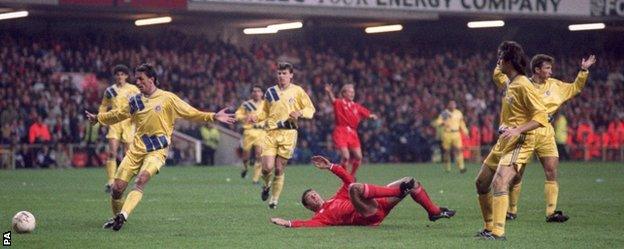
Dan Petrescu (r) tripped Gary Speed in the area
Two minutes after Saunders had equalised, Gary Speed latched on to a Jeremy Goss cross inside the Romania area before tumbling under a Dan Petrescu challenge. Swiss referee Kurt Rothlisberger pointed to the spot.
"When Wales got the penalty, I thought we were finished," said Dumitrescu.
"Because of the way the match had gone, with us missing some very good chances, I was thinking our opportunity had passed and now this was their big chance to go the World Cup."
While the Romania players argued with Rothlisberger, Bodin made his way towards the penalty area.
"I remember turning to see Paul walk up the pitch from his left-back position and thinking he looked white as a sheet," captain Horne told BBC Radio Wales.
Was he feeling the pressure? "I felt confident," said Bodin, "I wouldn't have stepped up if I didn't think I could score."
Bodin was trying to keep his concentration during the delay, and Romania goalkeeper Florin Prunea tried to distract him.
"While the referee was talking to the players, I saw the keeper pick up the ball and kiss it," he said. "I watched him do it and, where he kissed it, I wiped it into the ground. I don't know why, it was just by instinct.
"But that is not an excuse. I kept my mind and I kept my focus, and I just hit it as hard as I could. That was how I took penalties, by drilling them rather than placing them."
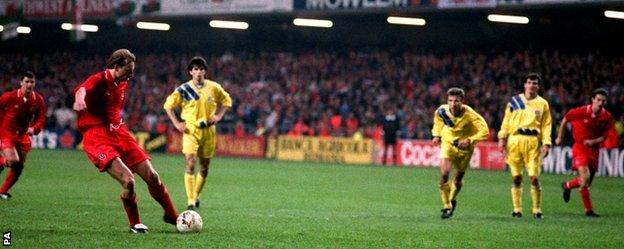
Paul Bodin steps up to strike his penalty against Romania
Bodin, who had scored all three of his previous penalties for Wales, certainly got enough power behind his shot - so much that the ball crashed off the bar and flew back high over his head.
"The crossbars at the Arms Park were oval, not round," Bodin explained. "I had hit it on the apex, so it came right back out. So if it had been half an inch lower it might have hit underneath the bar, and bounced down and maybe in."
The end
Wales hopes were not over after the miss. Ian Rush and Saunders both forced good saves from Prunea but, at the other end, Romania were also going close. Dumitrescu fired over after a weaving run and Florin Raducioiu missed a virtually open goal.
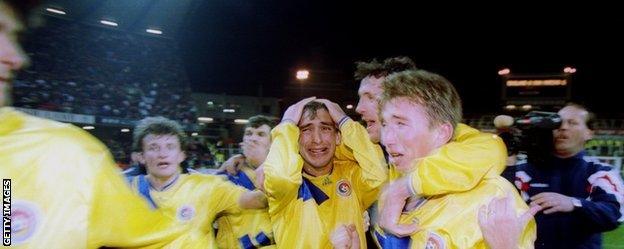
Ilie Dumitrescu (centre) was in tears at the final whistle
By now the game was wide open, but Romania's capacity for counter-attack proved decisive. They scored what proved the winner after 83 minutes.
"We were very fast breaking forward when we recovered the ball," remembers Dumitrescu. "I received the ball from Gheorghe Popescu in midfield and passed two or three players. One of them tried to foul me, tactically, but I did not stop.
"I saw Florin Raducioiu was in a very good position and, when he beat Southall, I thought 'we are going to the World Cup'."
As Wales trudged off deflated at the final whistle, the Romanians celebrated - and the flare that would kill John Hill was fired across the ground. Hill's death put Wales' failure in perspective, especially for Bodin.
"It was horrendous. I had seen the flare fly over our heads as we came off," said Bodin. "He was there to watch a game of football but he would not be going home."
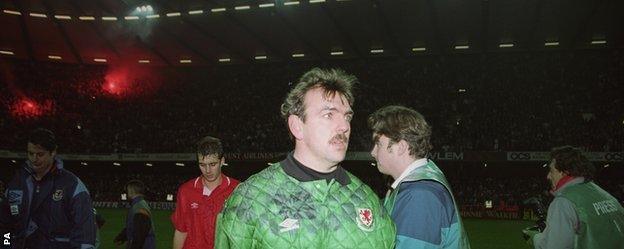
Southall was devastated at the final whistle and contemplated never playing for Wales again
What happened next
The mood was bleak among the Wales players afterwards. Southall, devastated by his mistake for the first goal, wanted to quit international football.
"I spoke to Shreeves after the game about giving up," revealed Southall. "I won't tell you what he said, but it ended in 'off'."
Yorath, meanwhile, knew his five-year stint as manager was over - his contract expired the following day - and Bodin was also at rock bottom.
"My wife and my mum were at the game and I remember seeing their faces in the bar afterwards," he said. "All of the boys told me it wasn't my fault but for me it was like the world had come to an end, and I did not get any sleep that night, or the night afterwards."
He remembers getting teased by Swindon players in training the morning after but, crucially, his manager John Gorman pulled him to one side and told him he would carry on taking penalties for the Robins.
"As is quite commonly known, we were awarded a penalty the following Saturday, against Ipswich," added Bodin. "I scored it. It was my duty as a professional not to let what happened for Wales affect what happened for my club.
"I do not want to sound like my miss for Wales did not matter, because it did. It was the lowest moment of my career. But I just had to get on with things. I had to bounce back."
Bodin would go to the United States for the World Cup the following summer, but only as a spectator.
Instead it was Romania who embarked on a World Cup adventure. With an imperious Hagi one of the stars of the tournament, they shocked Argentina and reached the quarter-finals - where they, in turn, went out after failing from the spot.
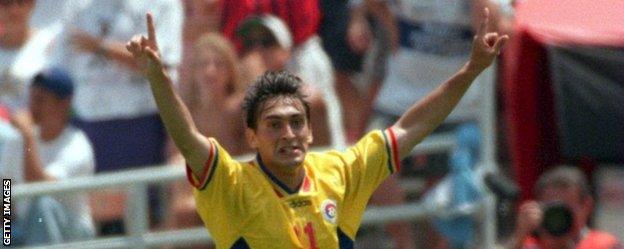
Dumitrescu scored twice as Romania shocked Argentina in the second round at USA '94
"The Wales game is remembered as being one of the most important games in Romania for our generation. When we got to America we had a great tournament but I also know how it feels when your team misses a vital penalty," added Dumitrescu.
He scored in a topsy-turvy shoot-out against Sweden but Miodrag Belodedici missed, and Romania were out. "It was our big chance to reach the semi-finals, but in a moment it was gone." Bodin will surely sympathise - a little.
Regrets, two decades on
"To be honest with you, that was the lowest point in all our careers," Horne said this week. "My way of dealing with it was to put it in a box and try never ever to think about it. I still do, of course, but I try not to because it is so heartbreaking."
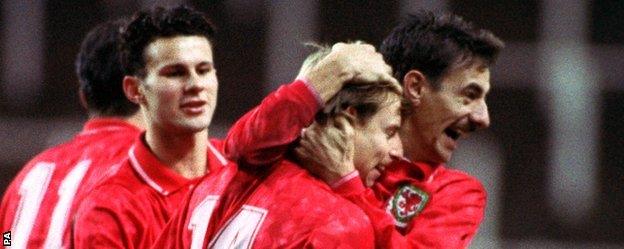
Bodin in happier times, celebrating a penalty against Luxembourg with Ryan Giggs and Ian Rush
Bodin, now 49 and coach of the Wales Under-17 side, has also had to come to terms with his miss. Thankfully, he has been able to move on.
"It still sits there in my head and it is obviously still talked about," Bodin said. "The most disappointing thing for me is that, unlike some players who miss a vital penalty, I never got the opportunity to put things right."
He has other fonder memories of his international career, like playing the pass that saw Rush run clear to score the winner against Germany in a European Championship qualifier in 1991.
And, if we are going to attempt to define Bodin's career by a penalty, then it is only fair to count a crucial one he scored too, five months earlier, for Swindon against Leicester in the 1993 play-off final that would decide who was promoted to the Premier League.
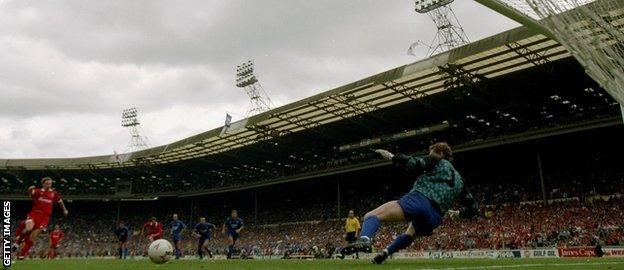
Paul Bodin scores the penalty that saw Swindon promoted to the Premier League in 1993
"There was probably more pressure on me at Wembley," said Bodin. "We had gone 3-0 up but been pegged back to 3-3. They were in the ascendancy when we got a penalty in the 84th minute. Again, I felt confident. That time, I scored.
"I still live in Swindon and that is the one that gets mentioned more there. I am sure it is different in Wales, though."
- Published14 November 2013
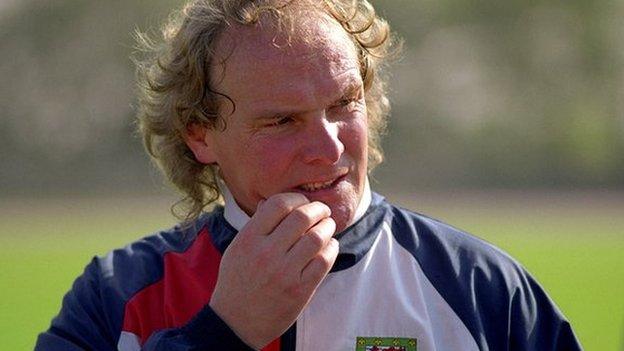
- Attribution
- Published13 November 2013
